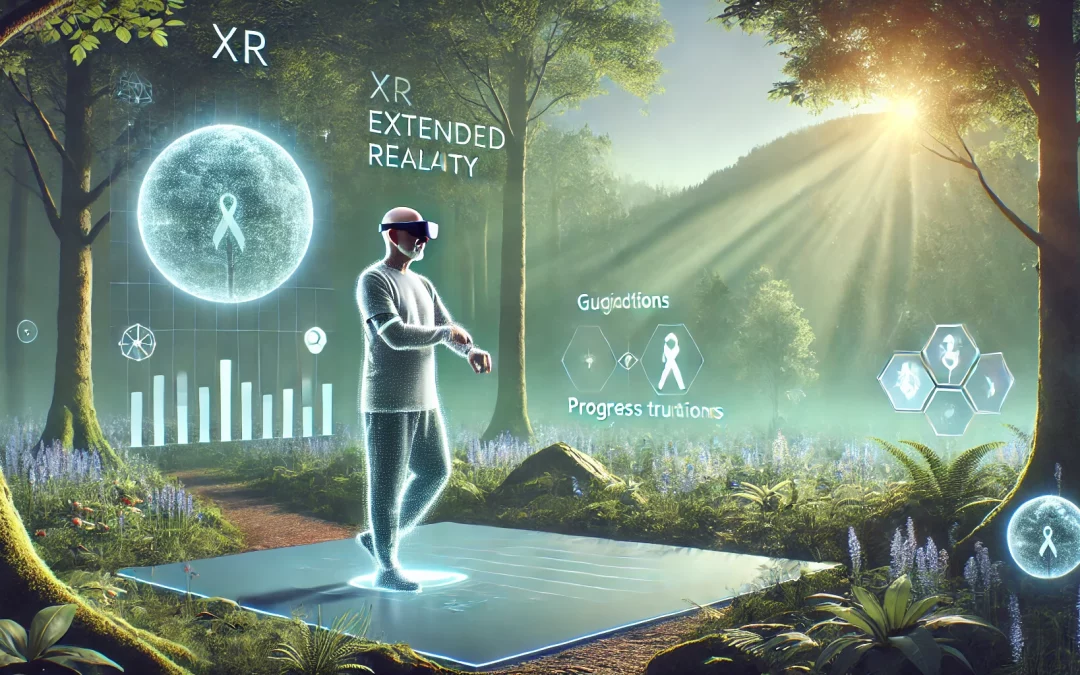For individuals recovering from cancer, the journey doesn’t end with the final treatment session. Many face lingering physical, emotional, and mental challenges that can feel overwhelming. At Outdoor Against Cancer (OAC), we’ve long championed the importance of holistic approaches, addressing not just the body but also the mind and spirit. Now, with the integration of XR (Extended Reality) technologies, we see a groundbreaking opportunity to expand these holistic efforts, making rehabilitation more accessible, effective, and empowering.
From Recovery to Resilience: The Holistic Impact of XR
Cancer recovery often requires more than physical therapy. Patients need support to rebuild psychological resilience, manage stress, and regain confidence in their bodies. XR enables an immersive and personalised approach, blending elements of physical rehabilitation with mental well-being practices. Imagine a patient not only performing guided exercises in a calming virtual environment but also participating in mindfulness sessions designed to alleviate anxiety or guided meditations to promote emotional healing.
These features make XR an excellent tool for addressing the unique needs of cancer survivors, particularly those dealing with fatigue, fear of recurrence, or reduced motivation. By fostering a sense of control and accomplishment, XR enhances self-efficacy, a core principle in OAC’s philosophy.
XR for Preventative Care: A Future Beyond Recovery
One of the most exciting potentials of XR lies in its use for preventative care. Cancer survivors are often at higher risk for other health complications, making it essential to adopt long-term, healthy behaviors. XR can gamify preventive fitness programs, keeping patients active and engaged through fun, interactive experiences tailored to their fitness levels and preferences.
For patients unable to physically access outdoor environments, XR can simulate nature-based experiences. Whether it’s a walk through a virtual forest or a light hike in the mountains, these immersive settings promote the mental health benefits of nature therapy while overcoming physical or geographical barriers.
Breaking Barriers: Ensuring Accessibility for All
Despite its promising potential, XR adoption comes with challenges: access to technology, affordability, and patient readiness. OAC is committed to addressing these barriers, advocating for funding initiatives, and working to ensure XR solutions are inclusive and available to underserved communities. By integrating SUN XR’s advancements into our digital offerings, we aim to make rehabilitation tools accessible to cancer survivors across Europe, regardless of their location or socio-economic status.
Empowering Cancer Patients with Personalised Care
At the heart of XR’s promise is its ability to offer fully personalised care. Each patient’s rehabilitation journey is unique, and XR allows for therapy plans tailored to individual needs. Whether focusing on rebuilding upper limb strength, improving balance, or managing chronic pain, XR ensures that every session is designed for maximum benefit.
Beyond physical recovery, XR also empowers patients to take ownership of their health. Real-time feedback, progress tracking, and interactive interfaces encourage active participation, turning rehabilitation into an engaging and rewarding process.
The Path Forward
As XR technologies continue to evolve, their role in cancer rehabilitation will only grow. For OAC, integrating these tools is more than just a step forward; it’s a leap toward a future where every cancer survivor has access to the holistic care they deserve.
By combining OAC’s commitment to nature-based and psychoeducational approaches with the cutting-edge innovations of SUN XR, we are bridging the gap between traditional care and the digital frontier. Together, we can transform the recovery journey, helping survivors not just heal, but thrive.

